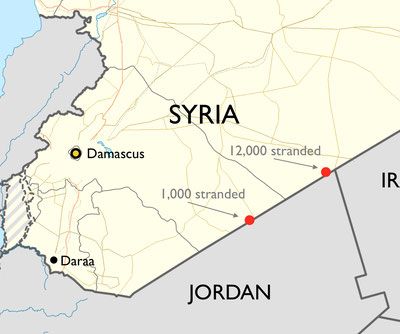 Regional geopolitical requirements, along with internal political and security concerns, have been the main pillars of Jordanian policy vis-à-vis the Syrian crisis.
Regional geopolitical requirements, along with internal political and security concerns, have been the main pillars of Jordanian policy vis-à-vis the Syrian crisis.
The management of security concerns associated with the growing terrorism on its northern border had become the main objective of Jordan’s foreign policy. Thus, many Jordanians are upbeat that bilateral relations will be back to normalcy in light of new realities in Syria in the field in pursuance of the tone of the Syrian officials towards Jordan.
Since the outbreak of the conflict in 2011, Jordanian diplomacy has been characterized by much mistrust and caution regarding the Syrian conflict unlike other neighbors of Syria. Thus, Jordan has been deeply concerned by instability and violence spreading to its territory.
Naturally, it has been Amman’s priority to adapt to the crisis on its northern border, not the issue of the survival or demise of the Syrian President Bashar al-Assad as Jordan has consistently sought a political agreement to end the conflict.
Fresh start
Jordanian politicians and people believe that it is the time to let bygones be bygones and to start afresh as Jordan and Syria should have close ties at all levels regardless of pressure Jordan is undergoing from regional and international powers.
When Jordan kept its embassy open in Damascus that was a positive signal to the Syrian regime that the kingdom keeps the minimum level of communication, which has been a wise and prudent policy at that time due to regional and international pressure.
There is no doubt that Jordan’s concern about the growing extremism on its northern border has been a severe blow for armed opposition factions
– Shehab Al-Makahleh
There is no doubt that Jordan’s concern about the growing extremism on its northern border has been a severe blow for the armed opposition factions at a time the kingdom maintained close contact with the Kremlin even before Russia launched its air campaign end of September 2015.
This has helped Jordan pursue political realism through its rapprochement with Moscow, which led to the demise and decline of armed opposition forces. As Moscow plays the role of “decision maker” in Syria, things seem to be heading towards restoring the regime control over crossings points between Jordan and Syria not only Naseeb-Jaber but also Ramtha-Dera’a with Russian help.
Terms to open borders
After the liberation of Naseeb crossing, Jordanian politicians close to the Syrian government had been informed by Damascus that the border point will not be opened before a comprehensive strategic understanding with Jordan is reached, not only for economic purposes but also for strategic and security considerations.
This entails that Syrian and Jordanian officials would be paying mutual visits in the coming era, a gesture to start or restore official relations.
Despite Jordan’s official statements that Amman’s relations with Damascus are ongoing at military and diplomatic levels with the Syrian side, the Syrian regime’s intention in the aftermath of recovering Nasseb crossing to have full relations with Jordan reflect otherwise. This entails the exchange of ambassadors first before any talk about economic, security and political ties.
In May 2018, Amman received many positive messages from Damascus to re-establish contacts related to border arrangements between the two countries. Such Syrian messages have been decrypted by Jordan, some of which demonstrated the Syrian government’s willingness to overcome the old political differences to start economic activities in the reconstruction process of Syria with the Jordanian private sector.
This explains the visit of the chairman of Jordanian Chambers of Industry to Syria last May, accompanied by a number of businessmen. Some of these messages have also included assurances that the Syrian government understands Jordan’s atmospherics and pressure exerted on the country since 2011.
However, communications through Jordanian security and military channels have been active, and political and diplomatic channels remained open. Before March 2011, Jordan and Syria have largely formulated their economic and political affairs based on a sprouting sequence of strategic partnerships.
A breakthrough?
When Jordan’s King Abdullah II said in an interview with Jordan News Agency, Petra, that he is “deeply concerned” about the situation in southern Syria and that his country’s border with Syria would only reopen “when the right security conditions materialize on the ground,” this is the condition that Jordan has for the Syrian government.
And with the recovery of the borders with Jordan, this condition is met and Jordan is looking forward to reopening the crossing point to jump-start trade activities. However, this is not what Syria wants at present.
In spite of all differences that marred Jordanian-Syrian ties for eight years, bilateral relations are moving in an increasingly positive direction. The coming months may prove to be pivotal ones in their relations, bringing temperature to their pre-2011 era. Since August 2017, al-Assad has been sending positive messages to Jordan.
The remarks of the Syrian president and his interviews with foreign TV channels reveal that Damascus does not attach great importance to the opening of the border with Jordan soon, but attaches importance to a comprehensive security, political, military and economic deal that will help reach a kind of rapprochement and a détente between both governments. It is a full package deal or nothing.
Damascus has been sending messages to Jordan through Germany which is deemed an honest broker and a source of confidence for the Syrian government. These messages focused on the readiness of the Syrian regime to trade the Iranian presence on the Jordanian border with disarming the opposition and the Free Syrian Army factions.
The Naseeb crossing is one of the Middle East’s busiest trade routes as it connects Europe to the Middle East. Before the closure of borders, Jordan’s customs handled $1.5 billion-worth of goods a year. Now that amount is zero. Before the Syrian uprising in 2011, more than 5,000 trucks used to cross the border each month.
Article published in Al Arabiya: https://english.alarabiya.net/en/views/news/middle-east/2018/07/20/Syria-s-encrypted-messages-to-Jordan-.html












